The big item on Monday night’s RTM meeting was a proposed Fire Marshal construction fee ordinance and a motion to amend it to add a surcharge of $2.50 per $1,000 cost of construction, and direct it to the Town’s Affordable Housing Trust Fund.
If that sounds boring, give it a minute.
There was about an hour’s worth of testimony, with those in favor warning that the every year affordable housing bills proposed in the state capitol veered closer to mandates. All three Democratic State Representatives conveyed a sense that the town was on borrowed time. Those opposed insisted that directing fees for Fire Dept inspections to the Affordable Housing Trust would set a bad precedent and deprive the Board of Estimate and Taxation its oversight role.
While people spoke of a time 30 or 40 years ago when “lunch ladies” could afford to live in town, the cost of housing in Greenwich has skyrocketed, forcing the workforce to commute from increased distances.
The situation has not improved under Connecticut’s 8-30g affordable housing statute requiring every municipality to have at least 10% of their housing be affordable. Greenwich has been out of compliance since the law went into effect in 1989.
Why does it matter?
Until Greenwich achieves the required 10%, developers using 8-30g are exempt from local zoning except in rare instances of health and safety. Residents have balked at developers’ plans for multi-story apartment buildings they say are out of scale with existing residential neighborhoods. Some applications have been withdrawn; several are pending. Still the 10% goal is elusive.
In recent years legislation proposed in Hartford by Democrats with concepts like Transit-Oriented Development and Fair Share have gained traction.
Demands from elected officials to soften 8-30g so that it counts ‘naturally occurring affordable housing’ toward the required 10% – including housing offered to employees of private schools or country clubs – have not garnered sympathy.
“I know people want to get the housing trust fund funded, but this is not the way. The proper way is for those who are proponents of this amendment to make a contribution directly to the housing trust fund and encouraging their friends to do the same.”
– Ed Dadakis
The principal proponent of the amendment, Cheryl Moss, said complaints about budgetary implications were a “red herring.”
“The BET cut one of the fire trucks they requested to replace a very old truck that frequently breaks down,” Moss said. “Any money that comes in from the Fire Marshal review fee will go into the general fund and vanish.”
“Some have asked why we haven’t heard from members of the Trust speaking in favor of this proposed amendment. That is an excellent question,” Moss continued.
“When the amendment proposal first came before the Town Services in April we were told by the chair of the Trust about their difficulty in raising private donations and how this amendment, while not fully solving their funding difficulties, was an important step in the right direction…” Moss added. “So, I ask, who silenced them?”
Ms Moss said while only $34,000 had been raised from donations to the Trust, it was the only tool the town had to negotiate with developers looking to skirt local zoning regulations through 8-30g.
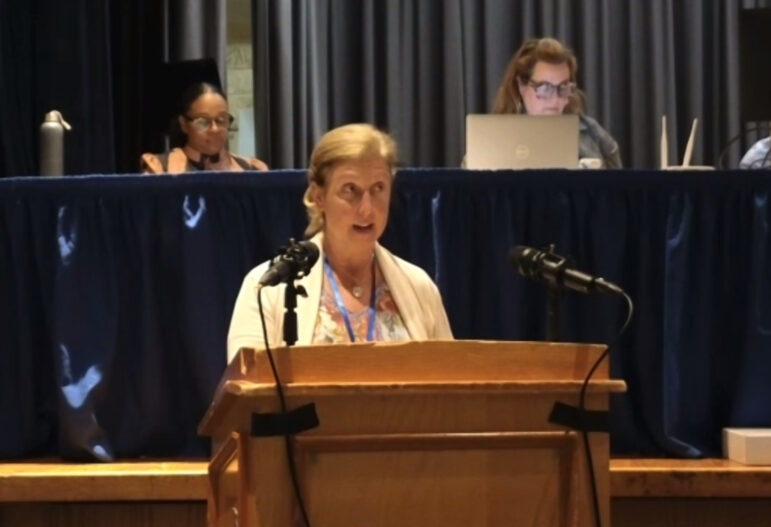
State Rep Rachel Khanna (D-149) said she and the two other Democratic Representatives had just ended a difficult legislative session in Hartford.
“We fought to defeat one-size-fits-all legislative mandates for increased affordable housing,” Khanna said.
However, she added, “These state efforts will keep coming because Connecticut is facing a housing crisis. As your representatives, our ability to resist top-down housing mandates is severely weakened when we fail to show local progress on the housing front. Calls for local control ring hollow in Hartford where they’re seen as efforts to avoid increasing housing stock.”
Khanna said a yes vote on the amendment would provide the state delegation with tools to resist “wrong-headed” housing mandates from Hartford.
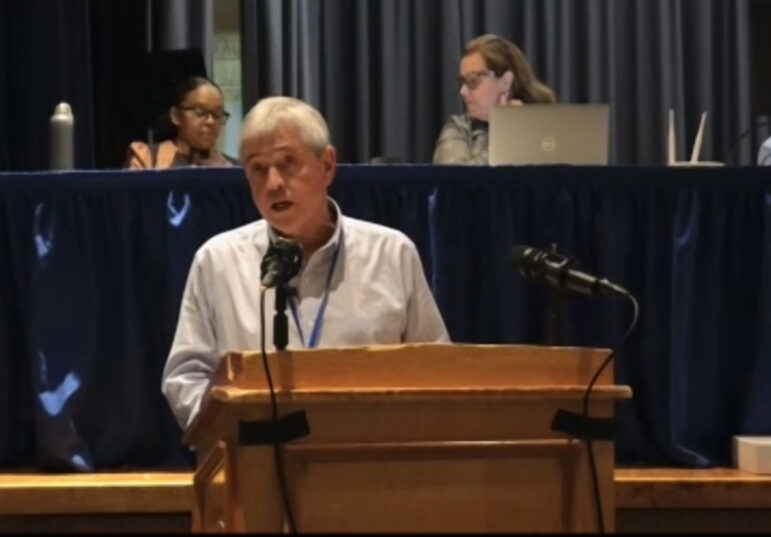
State Rep Hector Arzeno (D-151) said the amended SB 998 bill, while ‘watered down,’ had passed nevertheless.
“The Greenwich delegation voted no,” Arzeno said. “In my opinion, we gained time, but the need for more affordable and workforce housing in the state, the nation, and Greenwich, is a reality. We gained time to control our own destiny.”
“Our town leadership needs to increase efforts to develop and plan for the affordable housing needs of Greenwich,” Arzeno added. “Ninety-five percent of the Greenwich Communities (Housing Authority) housing was built more than 30 years ago.”
Phil Dodson said town funds should not be used to cover the Trust Fund’s “failure to conduct fundraising.”
“Some have argued that we have to do this to show Hartford we are doing something about affordable housing, when 34 Connecticut towns have not even filed a required affordable housing plan,” Dodson said. “Appearances mean nothing when Hartford is determined and only interested in bypassing local zoning control.”
Dodson said the proposed fee wouldn’t make much of a difference anyway.
“The proposed development fee will not cause Greenwich to reach the 10% affordable housing level. Nor would we become eligible for a moratorium from this requirement.”
Henry Orphys warned that approving the amendment would result in the BET and RTM losing control of an unspecified, but likely substantial amount of future revenues, setting a very bad precedent.
“If we wish to fund the Affordable Housing Trust, let’s allocate a particular amount of money for a particular year that this body discusses, debates and sets the amount of,” he said.
Finally, he said nobody knew what affordable housing bills might be proposed next year or whether they might pass.
“Many bills are introduced that go nowhere every year,” he said. “We should not modify our ordinances today based on speculative legislation that we don’t know what it will look like. We’ll deal with that if in fact it comes to pass.”
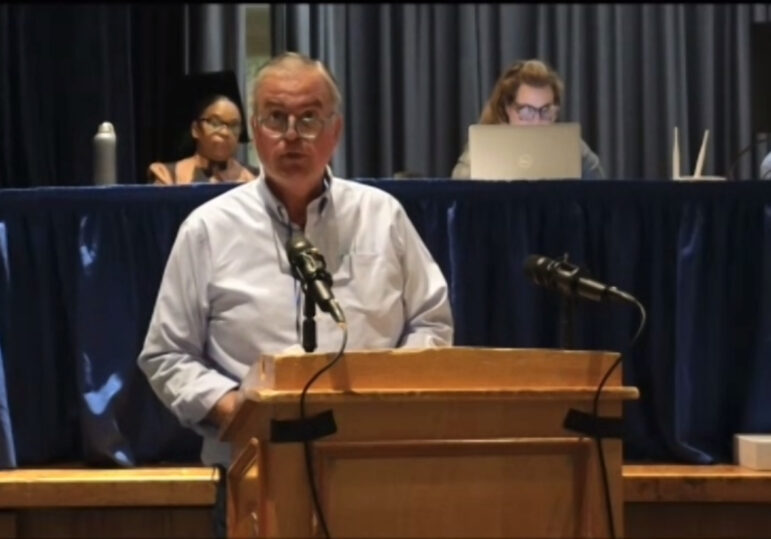
State Rep Steve Meskers (D-150) said that while the Greenwich delegation had voted against the recent affordable housing bills in Hartford, and he would continue to vote the will of his constituents, he urged the town show some financial commitment.
“Our position is better argued and better defended with resources, under town supervision and in conjunction with our P&Z commission. That means financial support from our town.”
“We can’t claim to care about our kids, to care about our seniors, and care about affordable housing without some level of financial commitment,” he added.
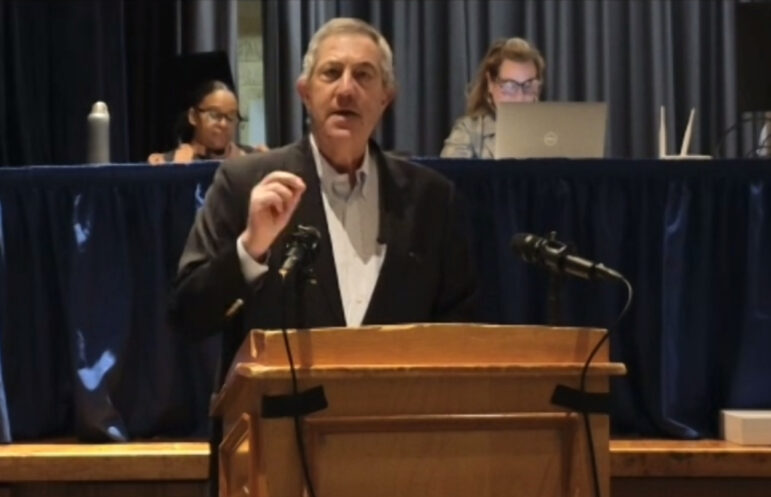
Ed Dadakis opposed the amendment.
“There is no town supervision,” Dadakis said. “That is wrong.”
“I know people want to get the Housing Trust Fund funded, but this is not the way. The proper way is for those who are proponents of this amendment to make a contribution directly to the Housing Trust Fund and encouraging their friends to do the same,” Dadakis said.
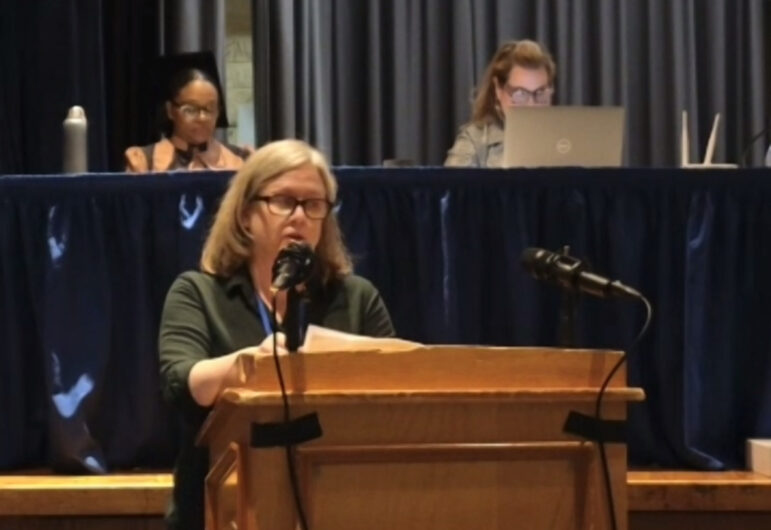
Lucy von Brachel said if the town did not take action it would lose local control.
“We can’t just pay lip service. Greenwich does not have enough leverage at the state level to amend affordable housing legislation.”
“If you’re paying any attention at all, you can see that the state is heading in the opposite direction, whether you like it or not,” von Brachel said. “Under existing law the only way for us to have any control over development until we achieve 10% affordability is to find creative solutions to that allow housing development without having a grossly negative impact on our community.”
She described the amendment as a step in the right direction.
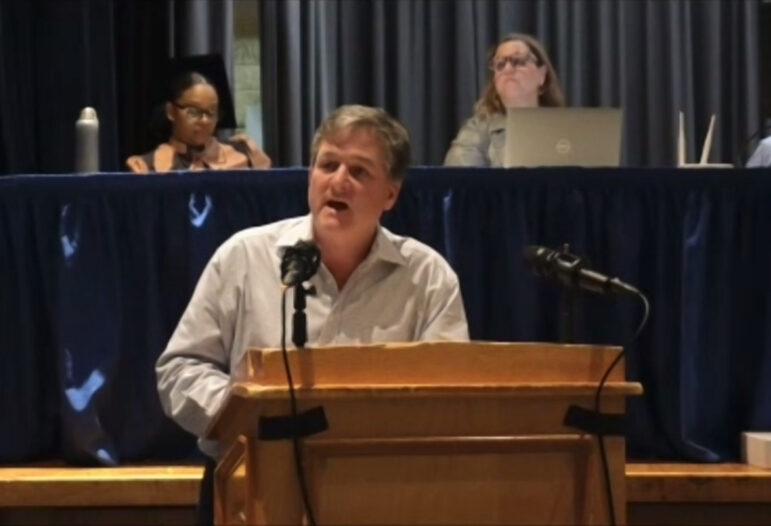
Board of Estimate and Taxation chair, Republican Dan Ozizmir said if the amendment were to pass, “It will mean there would be higher taxes or fewer services. It’s just a simple question of math.”
He warned against circumventing the town budget process where the BET reviews requests for funding.
“If you accept this amendment – you have a new trust, that has no track record, and they they will have funds approved for years – it could be $250K a year or $400K a year, nobody knows. And they will use those funds as they choose.”
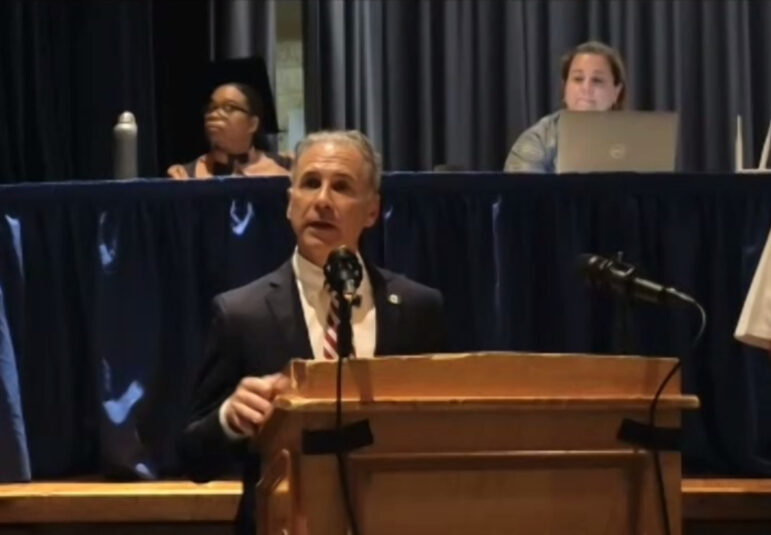
First Selectman Fred Camillo, who also serves as the Fire Commissioner, said while he supported affordable housing and saluted Cheryl Moss for the intention of her proposed amendment, it would set a terrible precedent.
“It takes public money and gives it to private developers,” he warned. “A bad precedent because it circumvents the BET, which is charged with managing the financial affairs of this town.”
Motion to Amend Fails
After about an hour of testimony, the motion to amend failed.
The vote was Yes: 75; No: 117; Abstain: 7.
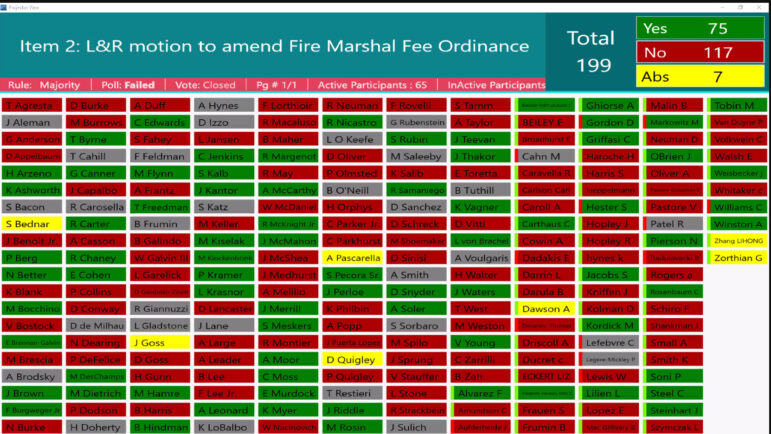
There was one speaker before a vote on the unamended ordinance.
P&Z Chair Margarita Alban cautioned against the fee, saying it was not in legal order.
She explained that a 2021 Connecticut state law prohibited any municipality from adopting higher fees for either 8-30g affordable housing developments or multi-family residential buildings of 4 or more residential units.
She noted that while that state law was in the zoning statutes, it referenced municipal fees in general, not zoning fees.
“The impetus was to prevent additional financial burden on multi-family housing versus single family,” she said. “Then, just last week the state legislature passed a bill which prohibits municipalities from charging any building permit fees for affordable housing whatsoever.”
“You might think this proposed fee is not a building permit fee, but fire sign-off is intrinsic to the building permit approval.”
Alban said while the proposed fees could plausibly be considered legal, the bigger issue to consider was that of intent.
“These laws were passed because there is a belief at the state level that towns fight greater inclusion by making it costlier to build multi-family housing,” Alban said.
The vote on the fee to be directed to the town’s General fund passed.
